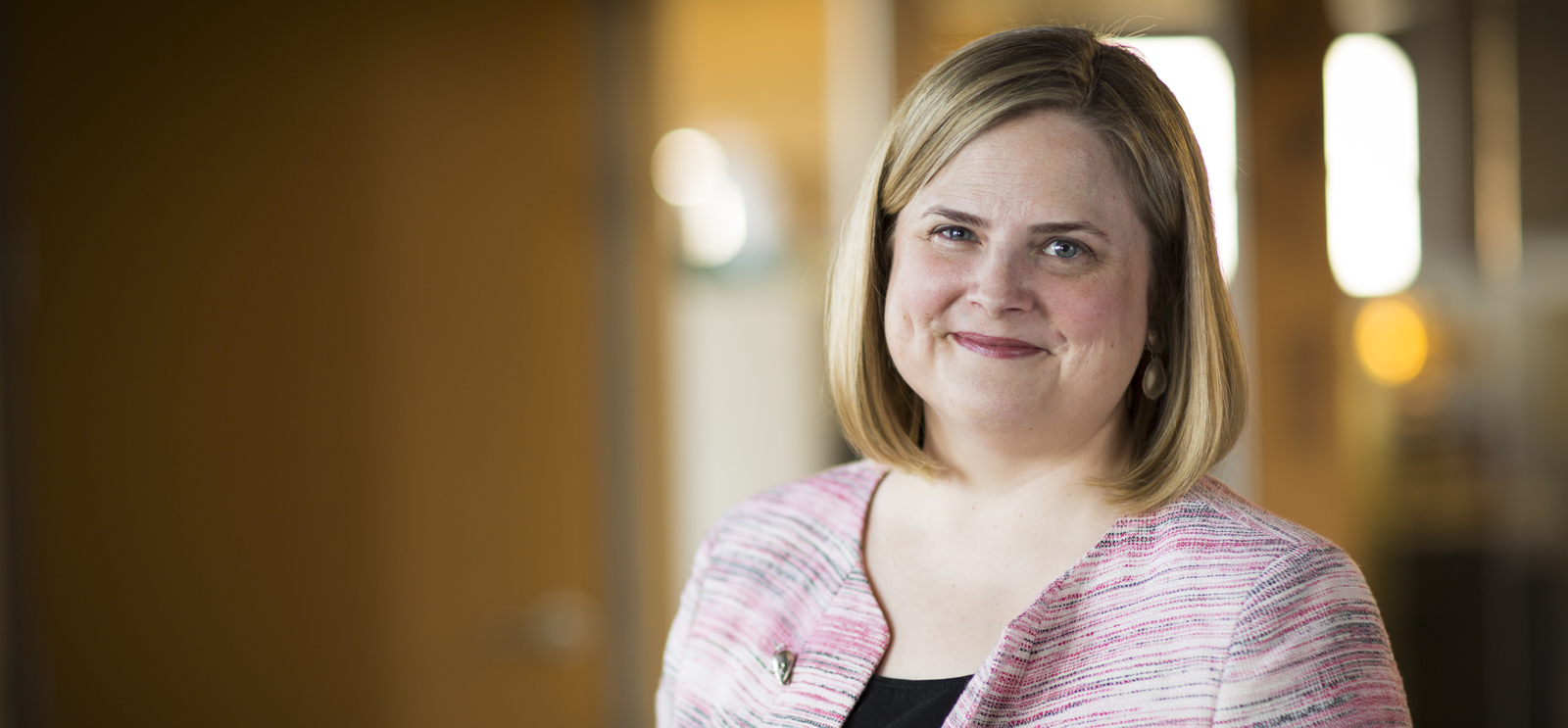
Miller received Chicago Booth’s 2015 Distinguished Public Service/Public Sector Alumni Award this past spring. (Photography by Chris Strong)
Alisa Miller, MPP’99, MBA’99, thinks public media can change Americans’ worldviews.
Think of the last news story you encountered. Maybe you watched it on TV or heard it on the radio or skimmed it on your phone. However you experienced it, there’s a good chance it focused on events in the United States—and that a man was being interviewed or profiled.
United Nations Entity for Gender Equality and the Empowerment of Women statistics show that women account for only 24 percent of news subjects in print, radio, and television; and international coverage makes up just 21 percent of the news Americans consume, according to a 2008 analysis by the nonprofit media company Public Radio International (PRI).
The startling lack of geographic scope and gender diversity in US media coverage was something Alisa Miller, MPP’99, MBA’99, knew she wanted to tackle when she became CEO of PRI in 2006. PRI produces and distributes radio programs including The World, Studio 360, and Science Friday.
Miller says the American news media’s limited focus can be seen clearly in the coverage of events like the 2007 death of former Playboy Playmate Anna Nicole Smith. That story dominated the news for weeks, while major floods in Indonesia and a key report on climate change went relatively ignored. The cycle repeated itself month after month, with coverage of celebrities and scandals eclipsing discussion of serious international issues. As the media fretted over the death of Michael Jackson, “other huge things were happening in the world that impacted millions and millions of people’s lives that no one was hearing about,” Miller says.
The skewed coverage has given Americans a heavily distorted worldview, Miller argues. She is particularly troubled by the media’s treatment of women. “When you have a broader news media environment where women are literally absent as experts, as people who are being interviewed ... that is not an accurate picture of the world,” she explains. “There are so many places where women are impacting the world, yet they are not who is being shown or being interviewed.”
In 2014 PRI launched Across Women’s Lives, an initiative aimed at highlighting the stories of women and girls from around the world, particularly in areas like Africa and India that receive little attention from American media. Recent stories in the series include a piece on female sake brewers in Japan and an analysis of efforts to curb sexual violence in Nicaragua.
Through these stories, Miller hopes to show that covering women isn’t just a symbolic gesture—it can be good for business too. “PRI’s audiences are growing,” she says. “We are reaching millions more people across social media because we engage women and we have content that includes women.”
Gender diversity is a personal issue for Miller, who is the first woman CEO of a major public radio network. Miller credits her parents for giving her the confidence to take on a challenging leadership role. When she was growing up in Lincoln, Nebraska, “[my parents] never said, ‘Why don’t you try doing this, because that’s something that girls do?’ It was always, ‘You can do whatever you want and make it happen.’”
After graduating from the University of Nebraska, Miller briefly worked in consulting before enrolling in a joint MBA/MPP program at the University of Chicago. The balance of policy expertise and business acumen spoke to her. “I’ve always been interested in media and technology as a business, and I’ve also been interested in how media and technology can transform society,” she says. To weave her passions together, she needed the language of both business and policy.
At Chicago Booth, Miller founded a group for students interested in media and entertainment. She launched a short-lived media start-up through the New Venture Challenge focused on the lifestyle and resort magazine industry and then took her first position in public media as director of business and product development for SesameStreet.org.
She never left the public media sector, which she calls “a place of great quality, mass reach, and ability to have a transformative effect on people’s lives.” Miller joined PRI as a senior vice president in 2001 and became CEO less than five years later. Keeping a level head and clear vision wasn’t easy at first. “I treated it like it was finals week every week,” Miller says of her early days as CEO.
Like many media companies, PRI has had to adjust to increasingly tight budgets and the disruptive influence of technology. It’s not obvious what role a program development and distribution company like PRI should play in an age when podcasters can create and disseminate their own content.
As she looks to the future, Miller sees both possibility and risk for the company she leads. “The opportunities have never been greater in terms of reaching and serving and engaging people deeply,” she says, nor have the economics of public media been more challenging. But “I gravitate towards that kind of complexity.”
Updated 11.16.2015
